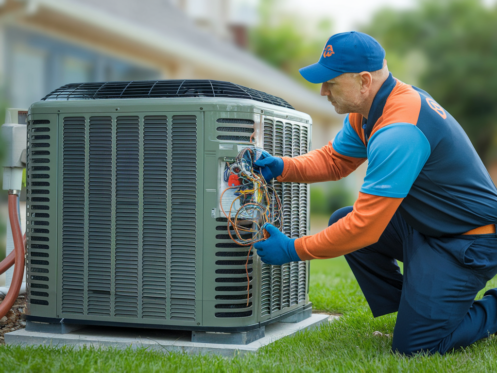When your AC unit outside is not turning on, it can be quite frustrating, especially during the hot Texas summers. For homeowners in the Greater Austin and Abilene areas, knowing why your outside AC unit might not start is important. This can save you time and help avoid extra repair costs. In this article, we’ll explore some of the typical reasons your outside AC unit might not be working and provide practical solutions to get it up and running again.
Understanding How Air Conditioners Work
Before diving into troubleshooting, it’s helpful to know the basics of how air conditioning systems operate. An air conditioner cools your home by taking heat from inside and sending it outside. It uses parts like the compressor, evaporator coil, and condenser coil to move refrigerant and remove heat. For a more detailed explanation, you can visit How Air Conditioners Work | HowStuffWorks. This resource provides a comprehensive overview that can enhance your understanding of your AC system’s functionality.
Common Reasons for AC Unit Outside Not Turning On
When your outside air conditioning unit isn’t coming on, it can be frustrating. Before calling a professional, check these common issues yourself:
- Power Issues: Make sure the AC unit has power. Check the circuit breaker box to see if the breaker has tripped. Reset it if needed, but if it trips again, there might be a bigger electrical problem.
- Thermostat Problems: Make sure the thermostat is set to the correct temperature and mode. Sometimes, the thermostat might need new batteries or a simple reset.
- Tripped Safety Switch: Some AC units have a safety switch that can trip and prevent the unit from turning on. Check the switch and reset it if needed.
- Blown Fuse: Inspect the fuse box for any blown fuses and replace them if necessary. This is a common reason for the AC unit not turning on outside.
By checking these simple issues first, you might save yourself a service call. However, if the problem persists, it might be time to consult a professional.
Electrical Issues and Safety Concerns
Electrical problems are a common cause when your AC unit outside is not turning on. Here are some potential issues to consider:
- Wiring Problems: Broken or loose wires can stop power to your AC unit. This type of issue should be handled by a professional to ensure safety and proper repair.
- Capacitor Failure: The capacitor is responsible for starting the motor. If it fails, the motor won’t start, and your air conditioner compressor might not kick on. For more detailed troubleshooting, visit our AC Compressor Not Turning On Troubleshooting Guide.
- Relay Switch Malfunction: If the relay switch is faulty, it can prevent the compressor from starting.
Safety is very important when handling electrical problems. It’s important to know when to call in a professional to avoid personal injury or further damage to your unit. For more information on keeping your home safe from electrical faults, visit this guide.
Air Conditioner Compressor Not Kicking On
The compressor is a crucial part of your air conditioning system. It plays a vital role in circulating refrigerant through the system, which helps in cooling your home. When the compressor doesn’t kick on, it can be frustrating and uncomfortable.
Here are some potential reasons why the air conditioner compressor might not be working:
- Capacitor Issues: The capacitor provides the initial jolt of electricity needed to start the compressor. If it’s faulty, the compressor won’t start.
- Motor Problems: The compressor motor can wear out over time, preventing it from starting.
- Electrical Problems: Issues with wiring or connections can also stop the compressor from functioning.
- Overheating: If the unit is overheating, it may shut down to prevent damage.
If you’re experiencing these issues, it might be time to consult a professional to diagnose and fix the problem. Ensuring your compressor is in good working order is essential for maintaining a comfortable home environment. For professional repair services, visit our Air Conditioner Repair page.
Importance of Regular HVAC Maintenance
Regular maintenance of your HVAC system is key to preventing problems and ensuring efficient operation. Here are some reasons why routine maintenance is important:
- Improved Efficiency: Regular tune-ups can keep your system running smoothly, reducing energy costs.
- Extended Lifespan: Proper maintenance can extend the life of your air conditioning unit, saving you money in the long run.
- Fewer Breakdowns: Identifying and fixing small issues before they become big problems can prevent unexpected breakdowns.
- Better Air Quality: Clean filters and ducts ensure that the air circulating in your home is clean and healthy.
For more detailed insights on the importance of preventative maintenance, you can refer to this helpful article on HVAC Preventative Maintenance. Additionally, check out our Comprehensive AC Maintenance Checklist for more tips.
Regular maintenance by professionals, like those at Quality Cooling & Heating, ensures your system is in top shape, providing peace of mind and comfort throughout the year.
When to Call a Professional
Sometimes, despite your best efforts, the problem with your AC unit outside not turning on might be beyond a simple fix. Knowing when to call in a professional can save you time and prevent further damage. Here’s when you should consider reaching out to a professional HVAC service:
- If you’ve checked the power supply, thermostat settings, and circuit breakers, but the outside air conditioning unit is still not coming on.
- When you suspect electrical issues or see signs of damage, such as burnt wires or a tripped breaker that won’t reset.
- If the air conditioner compressor is not kicking on, especially if you hear buzzing or humming noises, which might indicate a capacitor or motor issue.
- When regular troubleshooting steps do not resolve the problem and you want to ensure the safety and longevity of your system.
Quality Cooling & Heating offers expert services to diagnose and repair these issues efficiently. Our team is trained to handle complex problems with professionalism and care, ensuring your comfort and safety. Visit our website to learn more about how we can help you.
Summary and Next Steps
In conclusion, troubleshooting an AC unit that is not turning on involves a series of checks, from simple power issues to more complex electrical problems. Regular maintenance is key to preventing these issues and ensuring your unit runs smoothly, especially during the hot Texas summers.
- Understand how your air conditioning system works by visiting resources like HowStuffWorks.
- Check for common problems such as power supply issues, thermostat settings, and tripped circuit breakers before calling a professional.
- Ensure electrical safety and know when to seek expert help, using guidance from resources like this article on electrical faults.
- Consider regular HVAC maintenance to prevent problems, as supported by this Forbes article.
For homeowners in the Greater Austin and Abilene areas, Quality Cooling & Heating is dedicated to providing top-notch HVAC services. Whether you need routine maintenance or emergency repairs, our team is ready to assist. Learn more about our services and ensure your home stays comfortable all year round.


